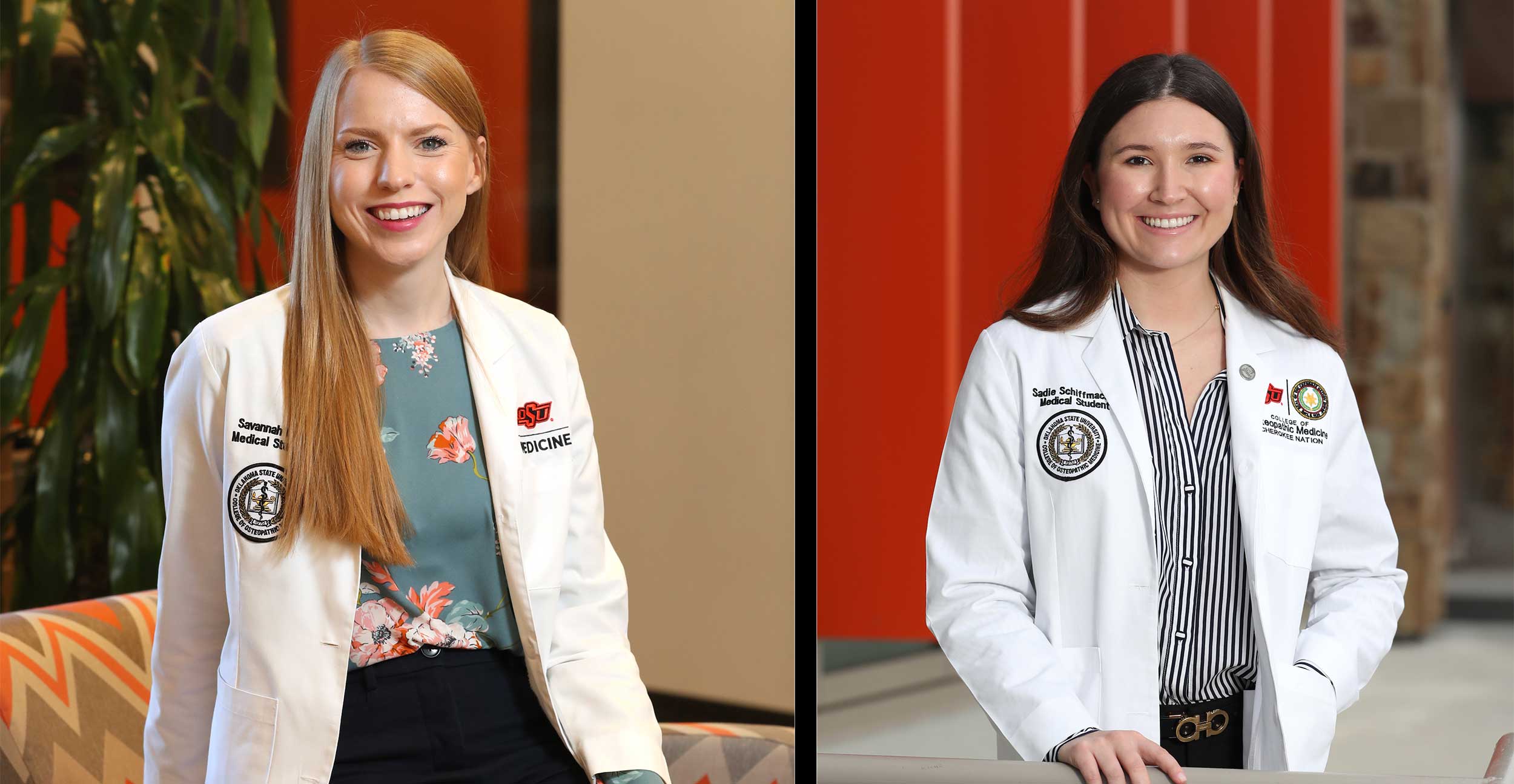
Historic wins for OSU-COM med students at OOA research poster competition
Thursday, March 17, 2022
Media Contact: Sara Plummer | Communications Coordinator | 918-561-1282 | sara.plummer@okstate.edu
OSU College of Osteopathic Medicine students took the two top spots at the Oklahoma Osteopathic Association’s Research Poster Competition earlier this year.
Savannah Nicks, a fourth-year medical student, along with Dr. Ben Greiner, an OSU-COM alum and current resident at University of Texas Medical Branch, was awarded first place and $2,500.
Sadie Schiffmacher, a first-year medical student at OSU-COM at the Cherokee Nation — along with co-authors Rachel Wilkins, a fellow first-year student, and second-year student Ashton Glover Gatewood — took second place and the $2,000 prize.
The OOA competition allows doctors of osteopathic medicine in fellowship or residency and students attending osteopathic medical school to submit abstracts and posters of their research to the competition.
Both research groups were mentored by Dr. Micah Hartwell with the Office of Medical Student Research, who is a clinical assistant professor of Psychiatry and Behavioral Sciences.
“Ms. Schiffmacher and Ms. Nicks are the first medical students named as finalists since 2016, and, to my knowledge, Ms. Schiffmacher is the only first-year medical student to place in the competition’s 13-year history,” Hartwell said.
Nicks and Greiner’s research looked at the potential overlap of nucleotide sequences between COVID-19 mRNA vaccines and common environmental allergens.
“Common features between COVID-19 vaccines, specifically Moderna and Pfizer BioNTech, and common allergens like dust mites and pollen may mediate allergic asthma and allergic rhinitis due to the immune responses provoked by their cross-reactive properties,” Nicks said.
Schiffmacher, Wilkins and Gatewoood’s research also dealt with asthma, specifically access to asthma medications in schools and asthma action plans. Schiffmacher said the topic was interesting to her because her younger sister had asthma growing up.
“I was surprised that many kids are not allowed to carry medications and an even larger number of children don’t have asthma action plans in place. Action plans are important for children with an asthma diagnosis in order to provide appropriate information to their school so they know how to handle an asthma attack,” she said. “I hope our poster and research raised awareness and will start conversations on what can be done to improve these issues.”
Both said they enjoyed getting the chance to present their research.
Presenting our poster at the OOA symposium was a great experience, and it was exciting to get to share the research we invested in with others. I was grateful for the opportunity to share our project with the medical community in Oklahoma.
Schiffmacher said she was grateful for the experience and the help from fellow medical students.
“This was my first poster presentation, but I was able to practice with Ashton and Savannah. They guided me on what to expect and ways to improve. I practiced a lot and felt confident with my presentation,” she said. “I’m proud to represent OSU and everyone who was on the project with me.”
Both said they were thrilled when they learned they had taken first and second place at the research competition.
“I was happy and proud to learn that we had won second place. I was even more excited when I realized Savannah had won first place because of how great it looked for OSU-COM. I am very fortunate my first research experience in medical school turned out the way it did. I want to thank Dr. Hartwell, Rachel Wilkins, Ashton Gatewood, Savannah Nicks and Ben Greiner for all their help and contributions to the poster. I wouldn’t have been able to do it without them,” Schiffmacher said.
Research is an important part of a medical school education as well as being a great doctor.
“One significant role physicians play is answering medical questions posed by patients,” Nicks said. “As a student training to become a physician, I have found that research is a great way to learn how to answer difficult questions and explore the intersection of our classroom education and real-world application.”
